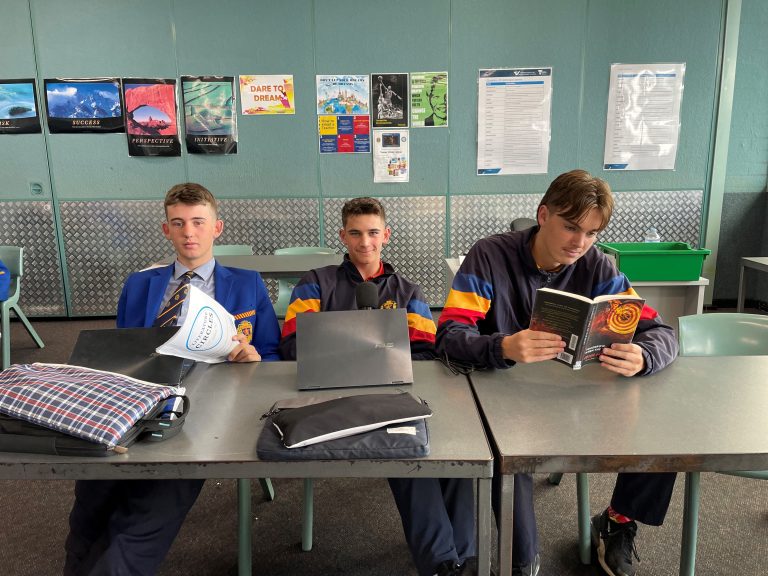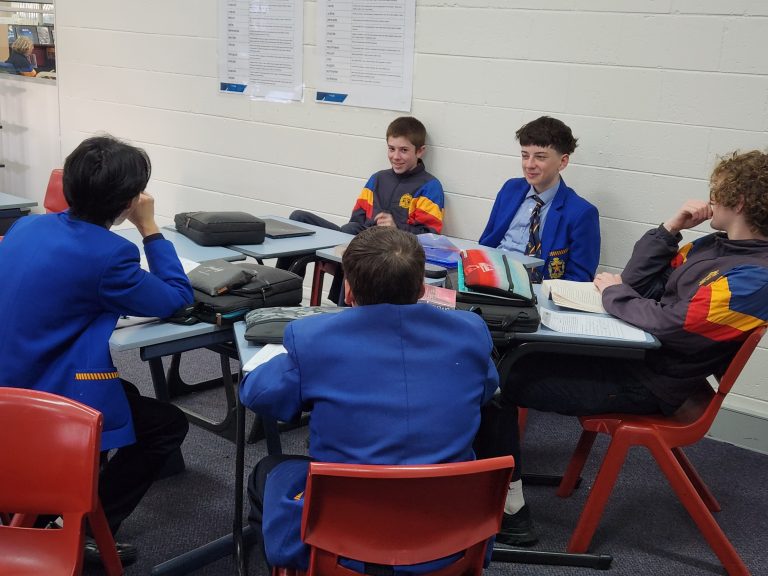The skills of reading, writing, speaking and listening are the cornerstone of learning for our students. We strive to engender engagement and passion for ideas, seeking to encourage students to connect their learning in English to other subjects and to the world beyond the classroom.
We aim to equip our students with the skills of articulate speech and writing, of persuasion, of analysis and critical thinking, to help them become highly literate and productive members of society and fulfil their individual potential. Our approach supports the diverse learning styles of all students and we strive for equitable learning opportunities across all English classes.
English is compulsory within the curriculum from Years 7 to 10 – English, Literature or English Language. Consequently, the development of our students’ skills in the area of literacy is a matter of critical importance. The program is sequential through the years and focusses on a range of skills including:
- Reading for pleasure
- Reading critically and for purpose
- Writing for a range of purposes and audiences, analytically, creatively and comparatively
- Public Speaking and Debating
VCE Studies in English
During VCE Years, all students must complete an English Area subject that is included in the calculation of the student’s Year 12 ATAR score. These subjects are English, Literature or English Language. We offer the following VCE English choices:
English
This mainstream English subject is generally studied by most Years 11 and 12 students. Students study a range of texts, which they respond to creatively, analytically and comparatively. Students also study how media texts persuade and they deliver an oral presentation on a current issue.
English Language
English Language is an exploration of the technical aspects of language, such as its acquisition, its development, parts of speech and writing, and most importantly, how languages can link to identity and context. This subject requires thoughtful, close analysis and the learning of many new concepts and rules. Students must be competent in English and have excellent study habits in order to succeed in this subject.
Literature
Literature focuses on the study of texts, on how we make meaning from texts and how writers use language to convey meaning. Students study a range of text types, including poetry, plays, novels, short stories and film texts. They respond creatively, analytically – with a particular focus on close passage analysis – and comparatively. There is also a focus on literary theory. Students who are skilled writers, deep thinkers and passionate readers would find Literature enriching.
“In English classes, we identified the need for our students to be more willing to experiment and embrace the unknown to expand their sense of wonder and adventure with learning.
The theme of being adventurous played out in many forms across the various year level classrooms, with learning happening in new and different formats. Whether it was hearing from a guest speaker on a new text, committing to a new unit on poetry writing, submitting work for competition, delivering speeches to large audience, podcasting, forming Literature circles or taking to the stage to bring the Bard’s Macbeth to life, our students were endlessly brave and bold with their English learning.
We thank our students for experimenting, expanding and taking risks that build their capacity to learn.”
Anastasia Kydas, Kalli Dimitrokalis and Robyn Kensley
Learning Area Leaders – English

In Association with English
Learning occurs in association with other opportunities to extend their learning and build on their strengths, with English-related co-curricular activities offered at St Bede’s College, including:
Public Speaking
Formal Oral Presentations at each year level are assessed in the English classroom. These also lead to year level competitions. A representative from each English class speaks to the whole level cohort, where they deliver a formal speech and give an impromptu performance. The two best speakers from each year level then go on to contest the Br Quentin O’Halloran Public Speaking Competition. In addition, enthusiastic students are given the opportunity to participate in VCAA’s Plain English Speaking Awards and in many other public speaking competitions held externally.
Debating
St Bede’s College has an excellent performance reputation in Debating, and is a regular in Debating Association of Victoria Competition and in the ACC Debating Competition. Students who become involved develop valuable strengths in their confidence, logical thinking, listening and critical analysis.
Writing Competitions
Students will be encouraged to take part in a number of writing competitions across the years, which extends their skills in writing short stories and essays.
Resource Centre’s Reading Program (Readers Are Dynamic)
Each English class from Years 7 to 9 have one scheduled lesson in the library. The aim of this arrangement is to continue to allow students regular exposure to a range of literature genres and to engender an active love of reading.

“English holds a vital place in my life. It gives me the capacity to communicate my conclusions, convictions, and feelings, permitting me to have a voice in society. Writing presents me to different characters, societies, and encounters. By drenching myself in numerous writings, I pick up a broader viewpoint and compassion for others, and knowledge into the complexities of the human condition.
English plays a noteworthy part in my life by progressing my communication abilities, broadening my viewpoint through writing, cultivating critical thinking capacities, and nurturing my imagination. It may be a subject that prepares me with basic aptitudes for both scholarly and individual development.”
Massimo D. – Year 9
“To me, English Language doesn’t even really feel like an English subject – of course, the metalanguage and essay pieces are near identical to standard English, however I’ve found the actual content of the course to be much more interesting.
Akin to a humanities subject, with very subtle resemblances to sciences such as Biology and Psychology, English Language follows more how language is used today and the reasoning behind it. Where regular English typically involves analysis of classic novels, English Language is a much more modern approach, we examine the ‘why’ and ‘how’ English Language is used in the real world and the journey it has taken to get where it is today.
Aspects of each English Language unit are relevant throughout the whole course, even into Year 12 – making, in my opinion, for a much more thorough learning experience.”
Robbie L. – Year 11









